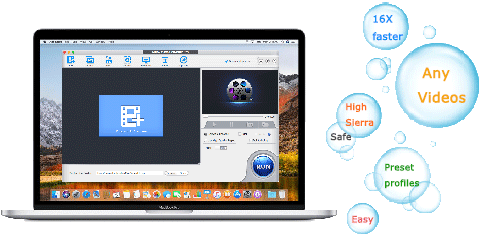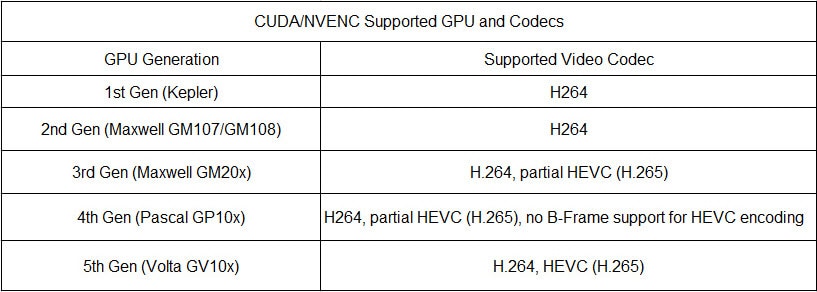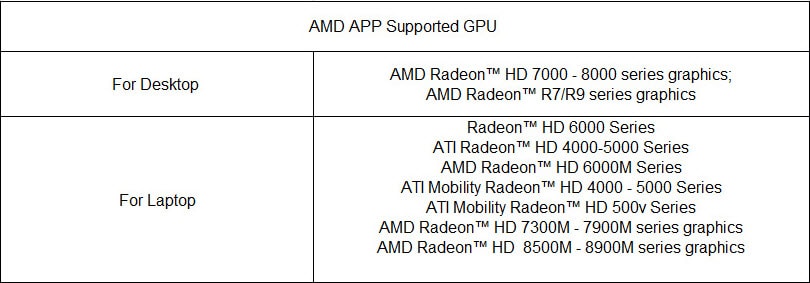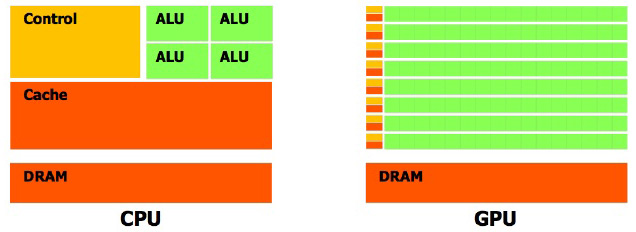You want to play the large-sized 12GB 4K video (AVI) captured by HD camera on your iPhone but find that you can't make this happen because iPhone is incompatible with AVI format. You download a 8.4GB movie torrent from website in MKV format and are prone to upload it to iCloud for watching without geographic limits. Yet, the iCloud supported video format list excludes MKV format. In such cases, the most simple solution is to convert video format, AVI to MP4 and MKV to H264. Everyone knows that. Well, here this post aims to tell what most users don't know.
That is how to convert large-sized HD/Ultra HD video at the fastest possible speed. To make HD or Ultra HD video conversion faster, the most effective method is to take full advantage of your hardware acceleration to improve video encoding speed. Yet, which one is better, GPU encoding or CPU encoding? If you really wanna know the difference between GPU and CPU encoding, your 2 mins reading time cost here would be valuable.
Convert videos fast with CPU/GPU Hardware Activated

Macxvideo AI is powered by both GPU Nvidia NVENC, AMD and CPU Intel Quick Sync Video to improve video decoding, encoding and processing speed up to 250-320FPS, 5X faster than others.
What is GPU Encoding?
GPU encoding can accelerate video conversion speed up to 2-3X faster by offloading compute-intensive work to GPU rather than CPU. Of course, it can't be completely away from CPU, cuz it still needs CPU to read the original data, check the process and manage data. To use GPU hardware encoding, you need to satisfy the below requirements first:
1. Your computer hardware configuration need to reach at least the entry level. The Nvidia CUDA/NVENC should be the 1st generation (Kepler) or higher.
2. The software you wanna accelerate is well-designed to access GPU hardware encoding tech and use GPU encoding feature.
3. Check if the GPU hardware encoding tech used on your computer and software are the same. If you computer features Nvidia CUDA or NVENC but your software only supports AMD APP GPU acceleration, then you can't benefit from the GPU acceleration.
4. Make sure the input and output video codecs are supported by both your GPU graphic card and the software you're using. Currently, the most common hardware encoding is used in H264/HEVC video encoding.
5. Install two discrete graphic cards and improve GPU configuration if the processing data is whopping large like 4K/8K large-sized video encoding.
6. The drive program must be upgraded to the latest version on your PC.
Now, when everything is ready, you can start to encode video using your GPU hardware encoding tech. And you will find that your CPU usage would obviously be reduced and the whole PC responsiveness and smoothness gets highly improved. Of course, nothing is absolute. In case your computer CPU configuration is strong enough and other configurations like GPU is comparatively weak (low-level integrated graphics), the so-called GPU hardware acceleration is actually ineffective. Thus, you're highly suggested to disable GPU encoding and let the powerhouse to handle this task.
Which GPUs Do Support Hardware Acceleration?
Until now, the most common GPU hardware acceleration techs are Nvidia CUDA/NVENC and AMD APP. Actually, they have a lot in common and work in basically the same way. So there is no need to once again explain the delicate difference among CUDA, NVENC and AMD APP. Instead, here we offer you what you concern most, the table lists of hardware acceleration supported GPU version and codecs.

The above table shows the current state of development. If there is some new info needed to be updated, please point it out and let us know by E-mail or comments at the bottom of this page. We would instantly update this table to provide the valid information for you. Certainly, it's a nice option to visit wikipedia or Nvidia official website to get the latest news if you don't find what you need from this table.

We feel very sorry that we don't find the specific codecs supported by the specific AMD GPU version from the authoritative website. You're warmly welcomed to share the related knowledge with us if you are willing to. A secret gift will be waiting for you as long as you become the sharer of knowledge.
What is CPU Encoding?
CPU encoding, much similar to GPU encoding, also utilizes GPU's dedicated media processing ability to cope with computationally intensive tasks to accelerate video encoding speed, rather than doing it on CPU itself. What makes CPU encoding different from GPU encoding is that if the workload is beyond the limits of GPU competence, CPU would be responsible for the rest of tasks. Though video decoding and encoding tasks are not CPU's specialty, it can also work with GPU to complete the task at fastest possible speed. The most common CPU hardware encoding tech is Intel Quick Sync Video, which can be activated and used to quicken 4K Ultra HD video encoding speed as long as the below requirements are achieved:
1. Intel QSV hardware acceleration is supported by your computer hardware. That's to say, your computer CPU processor is at least Intel® Core™ i3 - i7 with the 1st generation Sandy Bridge or higher and Intel® HD graphics GPU or Intel® Iris™ graphics GPU.
2. The software is built-in with Intel QSV tech, as well.
3. The drive program has already upgraded to the latest version.
4. The video codec can be supported by both your computer hardware and the software.
Some users might be not sure about if their computer supports Intel QSV acceleration. If so, please visit Intel official website to check the detailed CPU processor model.
GPU Encoding vs CPU Encoding: Any Difference?
We have already illustrated the definitions about what GPU/CPU encoding is. Now let's talk about the similarities and differences between GPU and CPU encoding.
Similarities:
1. Both CPU encoding and GPU encoding make use of GPU graphics processing capabilities to accelerate video encoding speed.
2. The purpose of both is to relieve CPU burden and let CPU handle more tasks with more smoothness and better responsiveness.
3. They can't do the hardware encoding stuff unless certain requirements are satisfied like CPU generation, GPU version, etc.
4. As for the video codecs, the common codecs are H264 and H265 supported by both CPU encoding and GPU encoding. Currently, the widely-used hardware encoding codec is H264.
5. A positive correlation exists between CPU/GPU encoding and hardware configurations. Higher configurations, faster encoding.
6. Generally speaking, the speed of CPU (Intel QSV)/GPU AMD/DXVA/Nvidia hardware acceleration is almost the same, improving speed up to 2-3X faster.
7. Both of them can't work without the participation of CPU.

Differences:
1. Theoritically speaking, GPU encoding is a little bit faster than CPU encoding. Yet, if the video transcoding task exceeds what GPU can handle, then CPU will automatically take over the rest of work to jointly complete the task. In this point, CPU encoding is superior to GPU encoding in transcoding speed.
2. They have different demands on CPU usage. Basically, CPU encoding and some GPU encoding (like Nvidia NVENC) have a little bit lower demands on CPU usage.
3. CPU encoding is more stricted with CPU configuration while GPU encoding has more demanding on GPU configuration. You can't install multiple CPUs on your PC but you can install several GPU cards up to 4 (based on your computer configuration) to dramatically improve video processing speed.
So far, these are all the similarites and differences between GPU encoding and CPU encoding we have discovered. We have to admit that this post leaves something to be desired. And we will feel very glad if you have helpful information to enrich this article. Leave your precious comments on the bottom.








